If you’re planning on celebrating Diwali this year and live with diabetes, you can still enjoy the delicious foods on offer and join in with the celebrations.
Known as the festival of lights, Diwali is a great time to get together with friends and family and enjoy lots of tasty traditional dishes. If you are living with diabetes, you might find it helpful to plan how you will prepare your food for Diwali in advance.
Diwali will be celebrated on 20th October, 2025. And we’ve picked out some of our favourite flavourful and healthy recipes below for celebrating the festival of lights, so you can spend less time worrying about your diabetes, and more time enjoying the fun.
We're also sharing some of our top tips for managing your diabetes during the festivities.
Diwali recipes
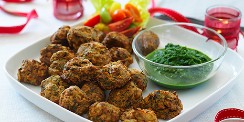
Baked mini spinach and onion bhaji with coriander dip
These mini spinach and onion bhajis would make the ideal snack or go perfectly alongside a homemade curry.
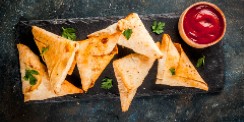
Shared by one of our supporters, these veggie samosas are a perfect addition to your celebrations. With no frying, or making the pastry from scratch, these are our easy and healthier version, perfect for any buffet.
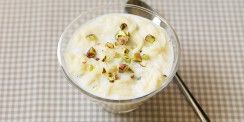
A classic South Asian dessert, kheer pudding is super simple to make and boasts deliciously fragrant flavours. Add spices of your choice, such as nutmeg or cinnamon, to make it even more flavoursome.
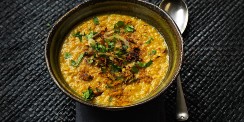
Channa dahl would be the perfect staple dish for your festivities and lentils are a source of protein, iron and fibre. Nutritious and tasty, this recipe is a must-do.
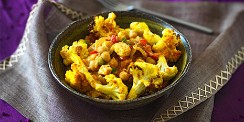
Roasted cauliflower, paneer and chickpea curry
The crispiness of the spicy cauliflower against the freshness of the paneer is a winning combo in this delicious veggie curry. You can swap the chickpeas with beans of your choice or add in different veggies to mix things up.
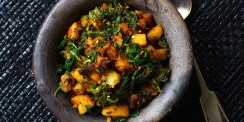
Saag aloo (spinach and potatoes)
A classic Indian dish, saag aloo features potatoes cooked in fragrant spices and spinach to create a wonderfully delicious side-dish.
How to have a healthier Diwali
Throughout the day, it’s best to eat more slowly-absorbed foods that have a lower glycaemic index, such as fruit and vegetables, wholegrain basmati rice, chickpeas and dhal.
These types of foods can help keep your blood sugar levels more stable during the celebrations, but be mindful of the portion sizes of carbohydrate.
Keep in mind, drinking alcohol interferes with your blood sugar levels and can make low blood sugar, also known as hypoglycaemia or hypos more likely.
If you’re eating more sweet foods than usual your blood glucose levels can rise, making you feel thirsty, tired and needing to wee more often. Watch out for these signs of high blood glucose and make sure you stay well hydrated on sugar free drinks.
You can also make some small changes to make traditional recipes healthier, such as:
- using vegetable oil instead of ghee
- using spices and herbs to replace the salt
- replacing free (added) sugars with artificial sweeteners
- using a small portion of dried fruits or ripe bananas to sweeten the recipe instead.
If you adapt a recipe using sweeteners instead of free (added) sugars, check the sweetener brand to help you work out the proper substitution ratio. Start with less and adjust gradually.
Try to reduce the total calorie, free sugar and saturated fat content of your puddings by having smaller portions and experimenting with making lighter versions. Try swapping whole milk for semi-skimmed and reducing the amount of ghee added, if possible.
Make a selection of salads such as avocado salad, tomato and onion salad or cucumber salad. Offer a street food experience with spicy soya sticks, chana masala chat, oat tikki and rajma tikki.
Popular flavours such as cardamom, cinnamon, rose water, saffron and nutmeg are great aromas in the kitchen and in your special occasion dishes. You can use these as much as you like as they will have no effect on your blood glucose, cholesterol or blood pressure.
The other important thing to remember is to stay active, as this will also help you to manage your blood sugar levels. If you monitor your sugar levels, don’t forget to check more during the festivities so you can spot changes in your blood sugar and stop them going too high or too low.
Don’t worry too much if you have one or two high glucose readings. This shouldn’t affect your long-term diabetes management, but you should aim to avoid repeatedly having high readings.
